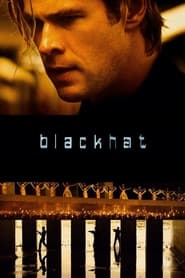There's a certain blandness to this sub-Bourne, cyber-globetrotting neo-Western, and it is engaging chiefly through analysing what is sucking the energy out of the room and giving it its dreamlike hue. Strange inter- and intra-scene editing decisions bleed tension like those shot-to-pieces shipping containers — themselves overly symbolic of the anonymous and commodified nature of globalised trade. And when the team moves too fast from one catharsis to the next, the lack of rhythm feels like observing someone clapping out time with the music. Is part of the problem immanent in that many aspects of this film feel designed to be friendly to the international film market?
There admittedly remains a certain artistry to the whole affair that "ultimately elevates it above the level of the material", but given how weak the plot and dialogue is, this is, alas, not saying that much. It's of course very hard to avoid cringing at the misunderstood technical jargon, especially given that this was made in 2015 and thus recent enough to learn the lessons from Sorkin's script from The Social Network (2010) and a whole two decades after Hackers (1995) showed how the inherently uncinematic computer stuff might be successfully integrated into a movie.
Still, Norse god Chris Hemsworth looks pretty fantastic with his floppy hair and designer sunglasses, and I'll try and emulate his look the next time I read Foucault, Lyotard or Derrida. Indeed, everyone seems to complain about how this film looks, but was anyone using their ears? There are a number of extremely poor overdubs that, with their different EQ and lack of ambient background noise, really take you out of the moment. Anyway, there is still a great film to be made about the Stuxnet worm, but I fear that "sentient A.I." has all the box office mindshare now.
The film’s title refers to the nominal distinction between white-hats and black-hats, those hackers supposedly serving the public good and those intent on seeding chaos for personal gain. Beyond its connection to the movie’s binary fixations, this terminology also conveniently borrows from the old-fashioned western, whose traditions are also consciously updated through a rollicking chase structure in which the one-time bad guy is given a second chance to make good, facing off against cheap shots and double-crosses from all sides.[…]
Shooting fully in digital for the first time, Mann expands on the woozy handheld work that made Collateral and Miami Vice so tactile and entrancing, his camera collapsing the spaces between bodies and objects without sacrificing spatial coherence, creating an artfully abstract collective muddle as neatly structured systems collapse into one another.
— Jesse Cataldo (Slant Magazine)
Mann no longer possesses (or no longer seems interested in flexing) the virtuosity required to make this onerous setup any more involving than the “Getting Started” tutorial for a new printer. [Still,] given that Mann acknowledged the impending death of film well before his peers, perhaps it’s only fitting that Blackhat should refuse to even suggest that the [geopolitical] status quo can possibly be restored. There’s a grim fatalism to this supposed thriller as it plants in a viewer the unsettling sense that it’s really only a matter of time before technology proves our undoing.
— Curtis Woloschuk (Blackhat)
You flinch, not just because the sound effects are loud and the camerawork tactically "messy," but because these primordial actions are contrasted against the electronic violence carried out by unseen cyber-criminals.
— Matt Zoller Seitz (RogerEbert.com)
The problem, I think, is that Mann hasn’t reconfigured himself for his new milieu. The Neuromancer-like world of cyberspace would seem to be a natural home for God’s Loneliest Man circa 2015, but [M]ann would rather be coasting the canals or stewing over crime scenes. The definiteness of computers seems to stymie him. For all his digital resources, his existentialism is analog.
Synopsis: Nicholas Hathaway, a furloughed convict, and his American and Chinese partners hunt a high-level cybercrime network from Chicago to Los Angeles to Hong Kong to Jakarta. As Hathaway closes in, the stakes become personal as he discovers that the attack on a Chinese nuclear power plant was just the beginning.

